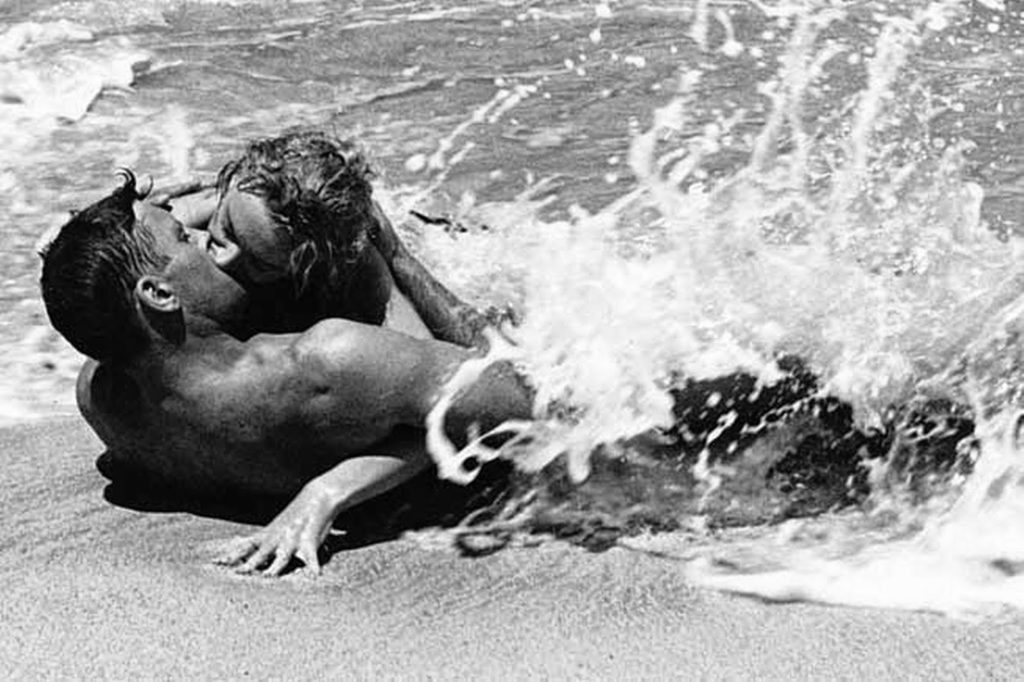
Director Fred Zinnemann is one of a handful of German directors, including Billy Wilder, Douglas Sirk and Robert Siodmak, who relocated to Hollywood in the thirties. In terms of political perspective, Zinnemann is the most like Douglas Sirk. Both men arrived in Hollywood with expectations of a sort of filmmaker’s Eden and got something completely different. By the end of WWII, Zinnemann and Sirk had become disillusioned with the so-called “American Dream”, and would, in the fifties, begin to subtly subvert American society in their films.
Zinnemann’s most critical film of his adopted home is his adaptation of the James Jones novel From Here To Eternity (1953) scripted by Daniel Taradash. For Zinnemann the army, that organization to which Prewitt (Montgomery Clift) has sworn his unwavering devotion, represents almost literally the conformity of the American middle class in the fifties. Prewitt’s principal motivation is to belong. This desire is made impossible by his unwillingness to perform as a boxer, for which he is repeatedly abused. Regardless, Prewitt refuses to relent, attempting again and again to belong to G-Company.
It’s reasonable to assume that for Zinnemann Prewitt represents a close approximation of his own experiences in Hollywood. Like Prewitt, Zinnemann desired to belong to his adopted studio system, but found obstacles in the differences in production from the German studio UFA. Unlike in Germany, in Hollywood the producer was king, not the director. This is the classic frustration of every immigrant film director of this time, when the control promised them to bring them to Hollywood is with held, and they are forced to work on films in which they have no interest.
The film’s other male protagonist, Sgt. Warden (Burt Lancaster), runs G-Company, and is therefore at the center of American conformity. But Warden is willing to throw his position away when he begins an affair with the married Karen Holmes (Deborah Kerr). To enjoy his blossoming romance without losing his position, Warden is forced to sneak around, to elude detection. Yet, all of this evasion is eventually in vain when Warden chooses his career over his lover.
In many ways Warden is the most tragic character in the film. From the start of the film it is clear that his own self-identity is linked to the army, a notion reinforced by his reaction to Karen Holmes’ suggestion that he apply for a promotion. Warden’s life, in the context of the film, has gone as far as it’s going to. Rather than demonstrate any personal growth or triumph, Warden’s character arc peaks when he begins his affair and flat lines again when he ends it, his life unchanged.
Karen Holmes has an almost mirror trajectory of her lover’s. She proposes to Warden that he apply for promotion (a promotion to the rank of her husband’s) while she gets divorced and then they can be married. Like Warden, her happiness is in embracing the status quo. Perhaps this is why the infamous beach love scene is so famous, it is the only moment in the film where two romantically attached characters shed their inhibitions and embrace non-conformity as a necessity to love (which seems to by Zinnemann’s intended message).
If that truly was Zinnemann’s intended reading of the Warden-Holmes relationship, it certainly helps illuminate the fatalism Zinnemann has attached to successful non-conformity, where individuality in the fifties is something to be met with violence and ultimately destruction. Maggio (Frank Sinatra) represents non-conformity as its purest in From Here To Eternity. Maggio always says what he thinks and often does what he wants, regardless of army protocol or social mores. Of course, this puts him at odds against “Fatso” Judson (Ernest Borgnine), the Sergeant of the Guard at the stockade. Once in the stockade, “Fatso” beats the insubordinate Maggio to death. Hearing of this, Prewitt kills “Fatso” in a knife fight, and after being wounded himself, goes AWOL. This is Prewitt’s turning point away from the army and conformity with Maggio serving as the martyred catalyst. However, Prewitt is soon racing back to the army as bombs drop on Pearl Harbor. Like Maggio, Prewitt is killed by that to which he belonged but could not accept when he is shot by a G-Company picket line.
What’s strangely paradoxical about our society and the army in From Here To Eternity is that in male dominated society the individual, along with individuality, are met with admiration from individuals and hostility from the group. Warden’s relationship to Prewitt epitomizes this paradox, which seems to have frustrated Zinnemann about American culture. Time and again Warden condemns Prewitt’s stubbornness as “hard headed”, yet he praises Prewitt upon finding his dead body as “being a good soldier”. This demonstrates the general admiration of certain virtues (strength, resolve, ambition) and the rejection of certain means of expressing those virtues.
From Here To Eternity, like Douglas Sirk’s All That Heaven Allows (1955), manages to gloss over its critical subversions so successfully that it’s difficult to see beyond the superficial aspects of either film. Zinnemann, like Sirk, was a masterful artist capable of burying his political and sociological messages deep in high quality drama, rarely becoming preachy or two dimensional in his presentation of concept. It becomes ironic, all things considered, that From Here To Eternity was so popularly described using the two words “patriotic” and “romantic”.
